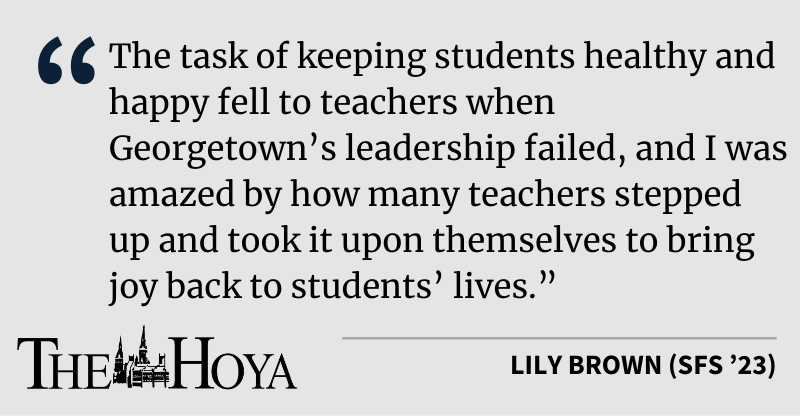The loud quacking of my phone’s alarm rouses me at 7:45 a.m., then 8:05 a.m., then 8:10 a.m. and then 8:15 a.m. before I finally force myself to get up and change my pajama top for a sweater around 8:45 a.m. Sitting in front of my computer, I open the shades on my windows to let in the strengthening morning sunlight and search through my Google Calendar for the right Zoom link to my 9 a.m. biology class.
Last semester, there were so many mornings when getting out of bed for an early class took an incredible amount of effort, but I knew I could not be late or I would miss professor Heidi Elmendorf’s morning wave. Something so small provided a little bit of joy that was missing in many people’s lives. I am incredibly grateful for professor Elmendorf’s kindness last semester, in addition to professor Miléna Santoro and the many other teachers who went out of their way to find time for moments of connection in an increasingly isolated world.
As we start a new semester at Georgetown University and a fresh chapter in our country’s history, we should appreciate the teachers who go above and beyond for their students. The COVID-19 pandemic has left many Georgetown students stranded at their homes across the country, isolated from their support networks and struggling with mental health, illness and economic hardship. Last semester, many students had to take a full course load from their bedrooms, and Georgetown’s plan to take away long weekends left undergraduates without a single break for almost three months — 10 weeks of uninterrupted classes.
The administration’s reckless decision-making and poor guidance resulted in early semester burnout for both students and teachers. Students’ workloads left them overworked and overwhelmed, lacking even the time to breathe and decompress from the various health and economic stressors caused by the pandemic. The administration continued to stress its support of students without taking any substantial steps to hear their complaints, concerns or challenges, and many teachers felt their feedback in support of students was ignored.
The task of keeping students healthy and happy fell to teachers when Georgetown’s leadership failed, and I was amazed by how many teachers stepped up and took it upon themselves to bring joy back to students’ lives.
As a student in “Foundations of Biology” last semester, I had a 9 a.m. class four days of the week. This course was a 6 a.m. class for many students on the West Coast, but fortunately, professor Elmendorf was aware of the burden this could place on students and actively looked to relieve that pressure by having office hours at a wide range of times, keeping tests open book and flexibly timed, and beginning every class with a mandatory “good morning” wave! Though at the start of the semester waving enthusiastically at my screen felt goofy, it was not long before most of the class was all turning on our microphones to yell early morning greetings to our peers — much to the chagrin of our housemates, siblings and parents. By the end of the semester, our daily waves included giant teddy bears, pets and a class of almost 200 people with their cameras on, or at least wave emojis up on their screens, and professor Elemendorf encouraged students to take time in class to show us scenes outside their windows from Turkey to China and beyond, creating connections even at a distance.
In another class, professor Santoro, my French professor, understood that many students were struggling to learn language over Zoom and allowed her students to retake an exam we all struggled with. For a different test in her class that she had to miss for family member’s surgery, she took the time to research the best lockdown browser and ask for student feedback on which programs they disliked. She even gave us her personal phone number in case we had questions during the test. Though she had her family to take care of, I was deeply moved by her commitment to our success and comfort in the virtual environment.
I write this Viewpoint not to say that small moments of connection — like a cheerful morning wave through a computer screen — can make up for the pain students feel because of the COVID-19 pandemic. Many students struggled with frustrated, angry or distant professors and found little solace in their classrooms during last semester. However, these stories are a reminder to us all that, as Albus Dumbledore said, happiness can be found in the darkest of places, if one only remembers to turn on the light.
So, to professor Elmendorf, I will never forget that wave. And to professor Santoro, I will never forget all the little opportunities of kindness you found. As we go into our third semester online, we should take a moment to be grateful for the teachers who kept us going during some of the most difficult years of college we will ever have.
Lily Brown is a sophomore in the School of Foreign Service.









